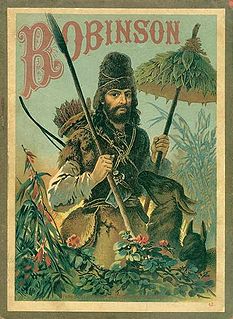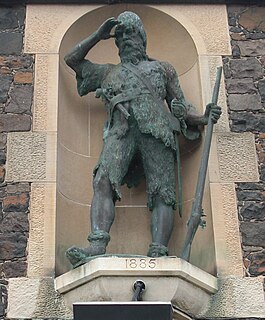 W
WA Voyage to the South Sea, and Round the World is a 1712 book by Edward Cooke, about a real-life trip around the world in two ships, under the command of Woodes Rogers. It is notable for including a firsthand account of castaway Alexander Selkirk, whose tale appears to have helped inspire Daniel Defoe to write Robinson Crusoe a few years later.
 W
WRobinson Crusoe is a novel by Daniel Defoe, first published on 25 April 1719. The first edition credited the work's protagonist Robinson Crusoe as its author, leading many readers to believe he was a real person and the book a travelogue of true incidents.
 W
WCanadian Crusoes: A Tale of the Rice Lake Plains is a novel by Catharine Parr Traill published in 1852, considered the first Canadian novel for children. Written after The Backwoods of Canada (1836), it is Traill's second Canadian book. It was first published in 1852 by London publisher Arthur Hall, Virtue, and Company. It was edited by her sister Agnes Strickland.
 W
WFoe is a 1986 novel by South African-born Nobel laureate J. M. Coetzee. Woven around the existing plot of Robinson Crusoe, Foe is written from the perspective of Susan Barton, a castaway who landed on the same island inhabited by "Cruso" and Friday as their adventures were already underway. Like Robinson Crusoe, it is a frame story, unfolded as Barton's narrative while in England attempting to convince the writer Daniel Foe to help transform her tale into popular fiction. Focused primarily on themes of language and power, the novel was the subject of criticism in South Africa, where it was regarded as politically irrelevant on its release. Coetzee revisited the composition of Robinson Crusoe in 2003 in his Nobel Prize acceptance speech.
 W
WFriday is one of the main characters of Daniel Defoe's 1719 novel Robinson Crusoe. Robinson Crusoe names the man Friday, with whom he cannot at first communicate, because they first meet on that day. The character is the source of the expression "Man Friday", used to describe a male personal assistant or servant, especially one who is particularly competent or loyal. Current usage also includes "Girl Friday".
 W
WThe Farther Adventures of Robinson Crusoe is a novel by Daniel Defoe, first published in 1719. Just as in its significantly more popular predecessor, Robinson Crusoe (1719), the first edition credits the work's fictional protagonist Robinson Crusoe as its author. It was published under the considerably longer original title: The Farther Adventures of Robinson Crusoe; Being the Second and Last Part of His Life, And of the Strange Surprising Accounts of his Travels Round three Parts of the Globe. Although intended to be the last Crusoe tale, the novel is followed by a non-fiction book involving Crusoe by Defoe entitled Serious Reflections During the Life and Surprising Adventures of Robinson Crusoe: With his Vision of the Angelick World (1720).
 W
WRobinson Crusoé is an opéra comique with music by Jacques Offenbach and words by Eugène Cormon and Hector-Jonathan Crémieux. It premiered in Paris on 23 November 1867.
 W
WRobinson Crusoe Island is a historical adventure novel for young people by Polish author Arkady Fiedler. It was first published in 1954.
 W
WRobinsonade is a literary genre that takes its name from the 1719 novel Robinson Crusoe by Daniel Defoe. The success of this novel spawned so many imitations that its name was used to define a genre, which is sometimes described simply as a "desert island story" or a "castaway narrative". In a robinsonade, the protagonist is suddenly isolated from the comforts of civilization, usually shipwrecked or marooned on a secluded and uninhabited island. He must improvise the means of his survival from the limited resources at hand.
 W
WAlexander Selkirk was a Scottish privateer and Royal Navy officer who spent four years and four months as a castaway (1704–1709) after being marooned by his captain, initially at his request, on an uninhabited island in the South Pacific Ocean. He survived that ordeal, but succumbed to tropical illness years later while serving aboard HMS Weymouth off West Africa.